Je Suis Charlie: A Thank You from France
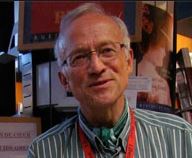

 At the American Booksellers Association members town hall meeting yesterday afternoon during Winter Institute 10 in Asheville, N.C., booksellers took the floor to discuss a range of topics, particularly the rising tide of minimum wage in parts of the country. (Other subjects discussed at the meeting will be reported in future issues of Shelf Awareness.) The event was a first for Winter Institute--typically, town hall meetings have only been held during BookExpo America.
At the American Booksellers Association members town hall meeting yesterday afternoon during Winter Institute 10 in Asheville, N.C., booksellers took the floor to discuss a range of topics, particularly the rising tide of minimum wage in parts of the country. (Other subjects discussed at the meeting will be reported in future issues of Shelf Awareness.) The event was a first for Winter Institute--typically, town hall meetings have only been held during BookExpo America.
Bradley Graham, co-owner of Politics & Prose in Washington, D.C., was the first to raise the question of what indies can do to survive increases in the minimum wage. The minimum wage in D.C., he said, is mandated to go up to $10.50 per hour this summer and will reach $11.50 per hour next year, and he noted that in some cities, including Seattle and San Francisco, the hike in minimum wage will be much steeper. "I'm wondering if the board has looked at this issue for all of us as a whole," Graham proposed. "Is there anything we can do to try to address this together?"
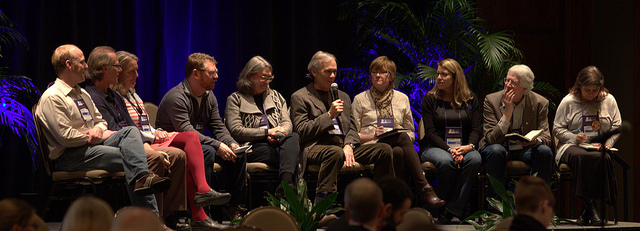 |
|
| The ABA board discusses how to deal with higher minimum wages. (photo: Kevin Mann) |
|
Steve Bercu, owner of Bookpeople in Austin, Tex., and the president of the ABA, acknowledged that the issue of raising minimum wage has been something that the board has been looking at for "a couple of years now," but hasn't reached a national answer. The majority of bookstore owners, he pointed out, were in the tricky position of "philosophically being in favor of paying people as much as humanly possible," but as small business owners, have to make payroll work and stay in business. Also, booksellers do not have the luxury of being able to charge more for their goods, as prices are printed on the books themselves. The ABA board has, he continued, talked to publishers about possibly finding ways around that, so but so far little has resulted from the effort.
Robert Sindelar, a board member and managing partner of Third Place Books in Lake Forest Park and Ravenna, Wash., suggested that indies in cities that are facing large increases in the minimum wage share any information or best practices they discover. Small businesses in Seattle, he said, were able to reach something of a compromise with the city government that allows them to defer some costs associated with the minimum wage increase.
Jonathon Welch, co-founder of Talking Leaves Books in Buffalo, N.Y., pointed out that those seeking to increase the minimum wage in New York are trying to have it tied more closely to the cost of living to make it a "more regularized cost for you to plan for than a big bump every couple of years." If booksellers around the country can agitate for that, he said, it might make the process a little smoother and a little less difficult.
"Educating local government and the public about the issue, so they don't have a knee-jerk response is really the first step," suggested Betsy Burton, board member and co-owner of the King's English Bookshop in Salt Lake City, Utah. The key was to make sure that others in the community understood what cost increases like that mean for small businesses and, especially, indie bookstores.
Michael Tucker, co-owner and CEO of Books Inc., which has a dozen stores in the Bay Area in California, compared San Francisco's incremental increases to the minimum wage with "boiling frogs." The minimum wage in the city will rise to $12.25 per hour in May, and will then increase by a dollar each year until it hits $15 per hour; after that, it'll increase by a percentage of the cost of living. "It does present some real issues," Tucker said. "The biggest issue is the ripple effect of what it raises for everybody else. If you have minimum wage at $18, what about supervisors and managers?"
"When you pay people more money, they can afford to live and shop in your community," said David Sandberg, owner of Porter Square Books in Cambridge, Mass., who made the point that the shopping local movement and the movement to increase the minimum wage are fundamentally linked. If the minimum wage goes up, he said, more money will stay in town. Although it was an "imposition" on a small business, it could also be positioned as something that is "fundamentally an issue of locality."
Tracy Taylor, general manager of Elliott Bay Book Company in Seattle, wanted to offer some words of advice for indies who might experience the same thing. One thing that did not happen during the discussions to raise minimum wage in Seattle, she said, was that there was not a single small business person on the task force that worked with the city's mayor. "It's important to get your voice out there early," Taylor urged. Meeting face-to-face with the city council and explaining the reality of being an independent bookstore completely "changed the conversation."
And something that took her completely by surprise, she added, was suddenly "being the bad guy in the room." The very loud, very vocal group of workers who supported the increase in minimum wage--most of them fast food workers--"didn't care if it put us out of business," said Taylor. "We're not usually on that side of the room." --Alex Mutter
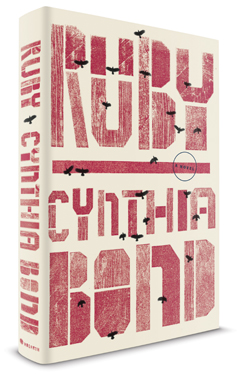 "Believe me, it's not easy finding words to describe Ruby, because nothing comes close to the experience of reading it," Oprah Winfrey observed about Cynthia Bond's Ruby (Hogarth/Crown), the fourth Oprah's Book Club 2.0 pick. She has also acquired film and television rights through her Harpo Films.
"Believe me, it's not easy finding words to describe Ruby, because nothing comes close to the experience of reading it," Oprah Winfrey observed about Cynthia Bond's Ruby (Hogarth/Crown), the fourth Oprah's Book Club 2.0 pick. She has also acquired film and television rights through her Harpo Films.
Winfrey's choice, which was released in paperback yesterday, is a debut novel that was "published last year to positive reviews and moderate sales," the Associated Press reported. The numbers changed quickly, with Hogarth commissioning a paperback printing of 250,000 copies. There is also an e-book edition, and 20,000 copies of the hardcover are in print.
Noting that she was hooked on Ruby from the first sentence, Winfrey said, "I thought, 'Wow, this is so good I have to wait until I actually have the time to absorb the language.' I put it down and waited until I was in bed with the flu to start reading it. I found the language and descriptions so vividly compelling that sometimes I would have to take a breath and repeat the sentences out loud."
An interview with Bond appears in the in the March issue of O magazine, which comes out February 17. Introducing the author, Winfrey noted: "When I found out that Bond is 53 and hadn't written a book before, I thought, Wow. This woman was born to write. There's no other explanation for such a vivid, searing first-time novel that penetrates through the page to the reader's heart. Writing is Bond's calling. No question about it. And when I found out that she's spent more than 15 years teaching writing to homeless and at-risk youth, I knew she must be truly special. I couldn't wait to call and tell her that Ruby is our new OBC 2.0 pick."
 Seeking to "enhance the profile of French writers and French literary culture," New York City's Albertine bookstore, a project of the Cultural Services of the French Embassy, "has been signing up independent bookstores across the United States to create special sections, called French Corners, to display French works in the original and in translation," the New York Times reported.
Seeking to "enhance the profile of French writers and French literary culture," New York City's Albertine bookstore, a project of the Cultural Services of the French Embassy, "has been signing up independent bookstores across the United States to create special sections, called French Corners, to display French works in the original and in translation," the New York Times reported.
Several indie bookstores, which have ordered titles from a pair of lists drawn up by Albertine, are promoting them through special displays and events. The Times noted that one of the lists "is a mix of 75 classics and contemporary works in French," while the other "is 60 books in English translation and 15 in French."
Participating indies include Politics and Prose, Washington, D.C.; Powell's Books, Portland, Ore.; the Book Cellar, Chicago, Ill.; Brazos Bookstore, Houston, Tex.; Brookline Booksmith, Brookline, Mass.; and Nunu Arts & Culture Collective, Arnaudville, La.
"It's long overdue," said Vivienne Evans, a manager at Books & Books, which has set up French Corners in three of its Miami area stores. "It's a great relief to point our huge number of French tourists toward this section. We should do Portuguese too."
Author Helen Eustis, whose college experiences inspired her Edgar Award-winning novel The Horizontal Man, "in which a philandering English professor is murdered at a small college replete with psychologically unstable students and professors," died January 11, the New York Times reported. She was 98. The Mystery Writers of America honored her in 1947 for best first novel. Eustis also translated books written in French, including works by authors Christiane Rochefort and Georges Simenon.
---
Carol Ann McElwain, an Ingram employee for more than 30 years, died February 2. She was 70 and had battled cancer for 15 months.
McElwain's first career was in dance--she studied it in college and danced with the New York City Ballet. Then in 1972, she joined Ingram, where she retired in 2006 as v-p of sales administration.
A funeral service will be held on Monday, February 16, 10-11 a.m., at St Paul's Episcopal Church in Murfreesboro, Tenn., followed by a celebration of life from noon-3 p.m. at the McElwain home in Antioch. In lieu of flowers, the family would appreciate contributions for the Club Mac Bright Space.
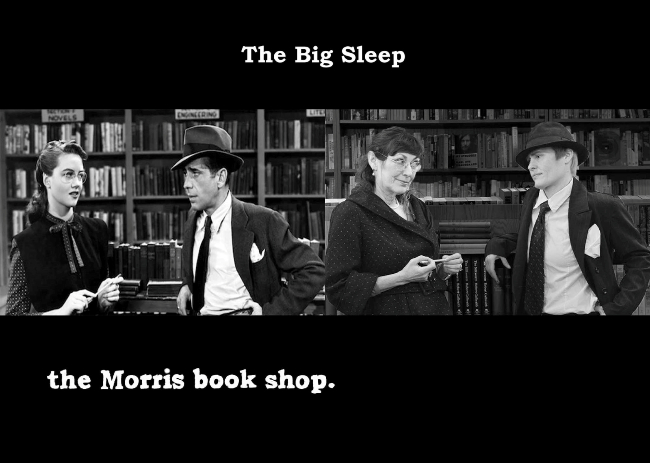 For Valentine's Day, staffers at the Morris Book Shop in Lexington, Ky., are re-creating the best bookstore meet-cutes ("Scenario in which two individuals are brought together in some unlikely, zany, destined-to-fall-in-love-and-be-together-forever sort of way...."). The bookstore is also tweeting the best #BookstorePickupLines.
For Valentine's Day, staffers at the Morris Book Shop in Lexington, Ky., are re-creating the best bookstore meet-cutes ("Scenario in which two individuals are brought together in some unlikely, zany, destined-to-fall-in-love-and-be-together-forever sort of way...."). The bookstore is also tweeting the best #BookstorePickupLines.
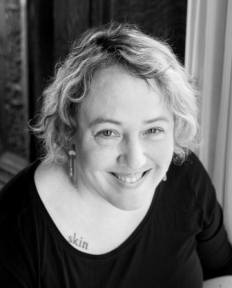 |
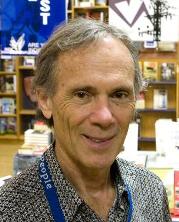 |
With the ABA Winter Institute taking place in Asheville, N.C., this week, Frank Stasio, host of WUNC's The State of Things, spoke with author, Small Beer Press co-owner and former bookseller Kelly Link, whose most recent book is Get in Trouble; and ABA president Steve Bercu, co-owner of BookPeople, Austin Tex., about "the fate of the independent bookstore."
Bercu noted that Asheville was a good choice to host the 10th anniversary of the Winter Institute for many reasons, including the fact that the city "is a very large nest of locally owned, independent businesses, and that is something that we as independent booksellers like to see when we go somewhere; the opportunity to go to a large community that has lots of independent businesses that seem to be, to me certainly as an outsider, the focus of this community."
Link, who worked for a children's bookstore in North Carolina during the 1990s, is one of the guest authors at Wi10. She observed: "There's wizard school if you're Harry Potter; then, if you're a bookseller, there's things like BookExpo or like this."
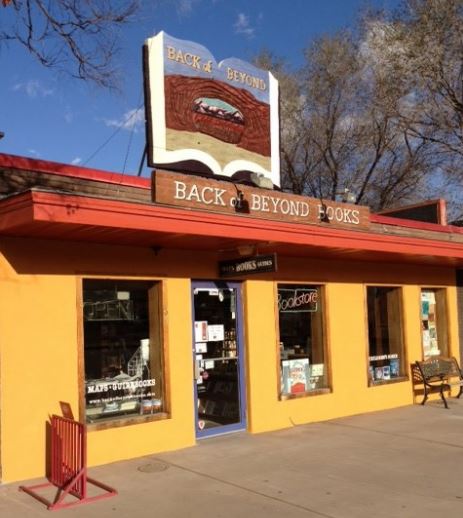
Though no specific events are planned for its anniversary, Back of Beyond Books will host several authors over the next few months: David Roberts, author of The Lost World of the Old Ones: Discoveries in the Ancient Southwest (Norton) on April 11 at 7 p.m.; Michael W. Leach, author of Grizzlies on My Mind: Essays of Adventure, Love, and Heartache from Yellowstone Country (WestWinds Press) on April 27 at 7 p.m.; Sean Prentiss, author of Finding Abbey: The Search for Edward Abbey and His Hidden Desert Grave (University of New Mexico Press) on May 13 at 7 p.m.; and David Gessner, author of All The Wild That Remains: Edward Abbey, Wallace Stegner, and the American West (Norton) on June 12 at 7 p.m.
 At Writer's Block Bookstore, Winter Park, Fla., which opened in October, owner Lauren Zimmerman's approach "is to offer something for everyone in her shop on Welbourne Avenue. She sells gifts, cards and new books for children and adults. She also hosts a discussion group and book signings," the Orlando Sentinel reported.
At Writer's Block Bookstore, Winter Park, Fla., which opened in October, owner Lauren Zimmerman's approach "is to offer something for everyone in her shop on Welbourne Avenue. She sells gifts, cards and new books for children and adults. She also hosts a discussion group and book signings," the Orlando Sentinel reported.
"I've always loved bookstores," she said. "They're like my Disney World." Her goal "is to connect with the community so people want to patronize her store and keep it in business. To that end, she provides a warm welcome, comfy chairs and music," the Sentinel noted.
"It warms my heart when I see someone there reading," she said. "Even if they walk out without buying a book, it still warms my heart. Because this is the kind of bookstore I'd want to be in."

Today on Fresh Air: Lynsey Addario, author of It's What I Do: A Photographer's Life of Love and War (Penguin Press, $29.95, 9781594205378).
---
Tomorrow on Diane Rehm: Anne Tyler, author of A Spool of Blue Thread (Knopf, $25.95, 9781101874271).
MTV's The Shannara Chronicles, based on the Shannara series of novels by Terry Brooks, has added three new cast members. Variety reported that Brooke Williams will play Catania, Daniel MacPherson will portray Ario and Marcus Vanco will appear as Bandon. They join a cast that includes Ivana Baquero and John Rhys-Davies. The Shannara Chronicles is filming in New Zealand.
Constantin Film and Robert Cort Productions are teaming up to bring Rhonda Byrne's bestselling self-help book, The Secret, to the big screen. According to the Hollywood Reporter, Raja Gosnell will direct the adaptation from a script by Bekah Brunstetter. Production could start as early as May.
"We took The Secret documentary and book and used it to create a completely original narrative," said Cort, who is producing with Byrne's Illumination Productions. "This new film is about how seeing and believing in love helps to make it real."
The film's story "centers on a hard-working, young widowed mother whose life is upended by the arrival of a mysterious stranger. As he shares his philosophy with her and her three children, they find both self-fulfillment and love," the Hollywood Reporter wrote.
The Chartered Institute of Library and Information Professionals has released longlists for the 2015 Carnegie Medal (author of a book for children and young people) and the Kate Greenaway Medal (illustrator of a book for children and young people), which are judged by a panel of expert librarians. Winners will each receive £500 (about $760) worth of books to donate to their local library and a specially commissioned golden medal. Since 2000, the winner of the Kate Greenaway Medal has also been awarded the £5,000 ($7,600) Colin Mears Award cash prize. You can find the complete CILIP Carnegie and Kate Greenaway longlists here. Shortlists will be announced March 17 and winners named June 22.
Agnès Guyon, chair of the judging panel, said, "It is fitting that having just cheered on the nation's libraries through National Libraries Day, we then celebrate the huge expertise of the nation's librarians with the announcement of the magnificent longlists for the 2015 awards. It is this expertise that I believe leads authors and illustrators to refer to the Medals as the awards that they 'most want to win.' "
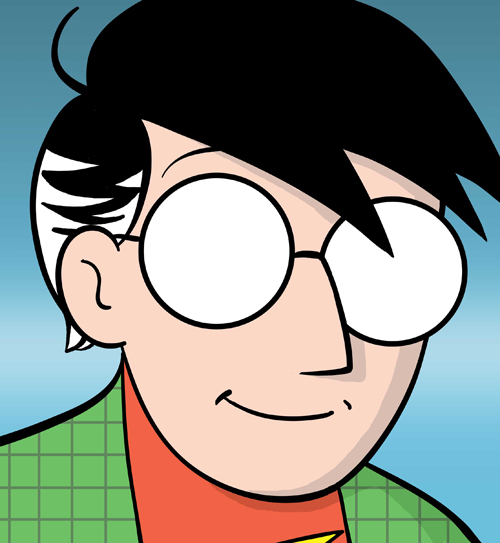 Cartoonist Scott McCloud is the author of Understanding Comics and its sequels, a series of nonfiction books about comics in comics form. He's a frequent lecturer and teacher on comics, digital media and visual communication. He originated the 24-Hour Comics challenge. His new graphic novel is The Sculptor (First Second Books, February 3, 2015). His online comics and writings can be found at scottmccloud.com.
Cartoonist Scott McCloud is the author of Understanding Comics and its sequels, a series of nonfiction books about comics in comics form. He's a frequent lecturer and teacher on comics, digital media and visual communication. He originated the 24-Hour Comics challenge. His new graphic novel is The Sculptor (First Second Books, February 3, 2015). His online comics and writings can be found at scottmccloud.com.
On your nightstand now:
How Music Works by David Byrne. I'm a sucker for books that promise to explain the inner workings of anything.
Favorite book when you were a child:
First favorite book as a kid was probably On Beyond Zebra! by Dr. Seuss. It opened doors that never closed again and set the tone for my entire worldview and career.
Your top five authors:
Today I'll pick Chris Ware, Jim Woodring, David Mazzucchelli, Osamu Tezuka and Will Eisner--all cartoonists, one of whom rarely even uses words. I'm making a point about visual literacy and also being a wise-ass.
A writer--living or dead--for whom you'd take a bullet:
Mark Twain.
Book you've faked reading:
Michael Crichton's Andromeda Strain, for a speed-reading class. Never mastered those techniques. I'm still a very slow reader.
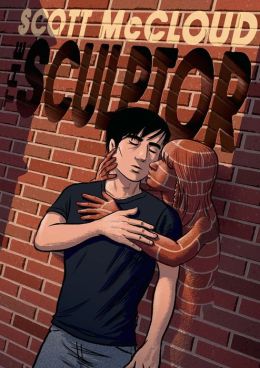
Market Day by James Sturm, a bulletproof graphic novel about a rug maker facing a crisis of confidence. Anyone in a creative career--or even contemplating one--should read this book.
Book you've bought for the cover:
Technically bought by a friend, but I would've done it if he hadn't: it was a literary anthology [of Alan Coren's work] with a giant swastika on the cover and the title Golfing for Cats in big bold letters. The introduction explained that they had done market research and discovered that books on sports, pet ownership and the Third Reich topped the bestsellers charts, so they decided to combine all three. Pure genius.
Favorite line from a book:
"The noises it made, or failed to make, were more like Sunday than Sunday itself." --John Wyndham, The Day of the Triffids. Or maybe "That terrible skull a mere fold." --Stephen R. Bissette, Tyrant
Which character you most relate to:
Schroeder from Peanuts.
Book you most want to read again for the first time:
The Queen's Gambit by Walter Tevis--one of the only books I've considered doing a graphic novel adaptation of. It just killed me when I found out recently that Heath Ledger was set to direct an adaptation of it shortly before he died.
Also, a simple introductory book on chess I read in summer camp, the name of which I will probably never recall. I vividly remember the experience of reading it as an almost physical sensation.
The Alex Crow by Andrew Smith (Dutton, $18.99 hardcover, 304p., ages 14-up, 9780525426530, March 10, 2015)
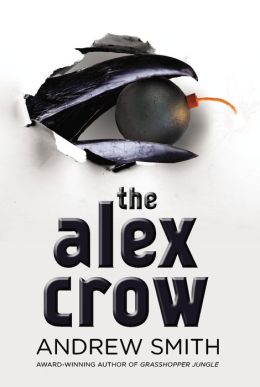
Fourteen-year-old Ariel's first life ended after he hid from rebel soldiers inside a walk-in fridge and emerged the sole survivor in a small town in an unnamed country poisoned by gas--the first miracle readers witness. A year later, Ariel, lives in Sunday, W.Va., with his adoptive American parents and brother, Max (a couple weeks older than Ariel). The father, an inventor, works for the Merrie-Seymour Research Group, which focuses on "savings things from nonexistence." One of his fascinating products is the family pet, Alex, a bionic crow reincarnated from its centuries-old extinction who is "overwhelmingly disappointed by his existence." (Depression is a side effect for revived animals.)
While outlandish, Smith makes this speculative element feel grounded, and sets up future events with a sure hand. In the summer after ninth grade, Ariel's parents send him and Max off to Camp Merrie-Seymour for Boys ("Where Boys Rediscover the Fun of Boyhood!"), away from distractions of cell phones and video games. Still, Ariel is overcoming these obstacles much better than the other two narrators, who are failing in their respective conditions.
Second narrator Leonard Fountain, often referred to as "the melting man," is on a mission: he taking a huge bomb he assembled in a U-Haul to destroy the Beaver King because Joseph Stalin's voice in his head told him to do so. This narrative can be suffocating, appropriately because of Leonard's anxious and suspicious imagination, but it's not nearly as smothering as the third narrative voice, unveiled through the diaries of an Arctic explorer whose ship, the Alex Crow, has been frozen for five months on an 1879 voyage to absolute north. The passengers' hope is diminishing as they become victims to vicious storms and time.
Smith's latest novel is daringly bizarre. Readers must reach the end of the story to understand and appreciate fully the magnificence of the interconnected narratives, but the conclusion is well worth the wait. The author sweeps up readers with the force of a story filled with memorable characters and scenes, laugh-out-loud jokes, unexpected tensions and plenty of genre-defying strangeness for those who think they've seen it all. --Adam Silvera, children's bookseller
Shelf Talker: The author of Grasshopper Jungle interweaves three stories set in a world that includes a 15-year-old refugee's miracle, resurrection-by-science and a depressed, bionic crow.
There were a lot of awesome comics this year, only some of which I reviewed because there were just too many, so I ensconced myself in a room and tried to read everything I missed. Here are my top picks of 2014, in alphabetical order. --Adan Jimenez
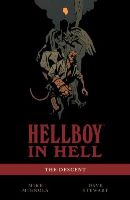
Mignola continues his tale of the monster-smashing demon, who is now stuck in the underworld. With references to literature and mythology, this book is both smart and action-packed, as Hellboy continues to beat up demons while doing his best Dante impression. And he even gets to meet Lucifer, which goes about as well as you would expect. My original review is here.
The Manhattan Projects Volume 1 by Jonathan Hickman, Nick Pitarra and Jordie Bellaire (Image, hardcover $34.99, 9781632151155).
"Science. Bad." What if the Manhattan Project was just a cover story for the creation of much bigger, and way more dangerous, scientific marvels than the atomic bomb? This collection includes the first 10 chapters of the alternate history science fiction epic in which all the great scientists you know (and a few you don't) behave in morally questionable ways in the pursuit of science.
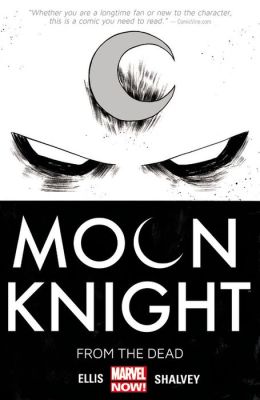
After Marc Spector died in the Egyptian desert, he was brought back to life by the god Khonshu. Taking the "what if Batman really was totally crazy" idea to new heights, Ellis and Shalvey reinvent Moon Knight as a street-smart, tough, and resourceful hero. He has the support of his three personalities for the first time in his career, as well as the NYPD. Each of the first six chapters are self-contained stories as varied as they are good.
Ms. Marvel Volume 1: No Normal by G. Willow Wilson and Adrian Alphona (Marvel, $15.99, 9780785190219).
Marvel has a long history of teen characters with real-world problems who happen to become superheroes for some ridiculous pseudo-scientific reason. Kamala Khan's origin story follows in the footsteps of Spider-Man, the Human Torch, and Daredevil, but with two important distinctions: she's a teenager today instead of the 1960s and she's a Pakistani Muslim. Wilson and Alphona have created a smart, funny, poignant story featuring a non-white, non-male character that still manages to resonate with readers, shattering an industry's preconceived notions of what constitutes a sustainable character in superhero comics.
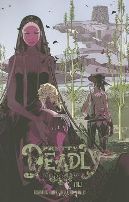
DeConnick and Rios prove mystical westerns are still very much viable with this story that borrows liberally from folkloric traditions and tales of the apocalypse. It features an amazing cast of characters, from Big Alice to Deathface Ginny, each becoming your favorite... until you meet the next one. My original review is here.
Sex Criminals Volume 1: One Weird Trick by Matt Fraction and Chip Zdarsky (Image, $9.99, 9781607069461).
Sex Criminals is more than just full of sex, it's also one of the most original concepts in comics today. Suzie and Jon have the power to stop time, but only when they orgasm, and only for as long as they’re "ready to go again." This is part sexual awakening narrative, part sex manual, part sex comedy and part sexual science fiction odyssey. My original review is here.
 Showa 1939-1944 and Showa 1944-1953 by Shigeru Mizuki, translated by Zack Davisson (Drawn & Quarterly, $24.95, 9781770461512 and 9781770461628).
Showa 1939-1944 and Showa 1944-1953 by Shigeru Mizuki, translated by Zack Davisson (Drawn & Quarterly, $24.95, 9781770461512 and 9781770461628).
The history of Japan as told by a master storyteller who lived through it, these two volumes cover the periods of World War II and the postwar occupation. Chronicling a macro view of events, as well as detailing his personal experiences during this time, Mizuki has created one of the greatest historical narratives from a viewpoint Westerners rarely experience. His vacillation from photorealistic to cartoony art and back is never jarring, except when it means to be. My review of the first volume, Showa 1926-1939, is here.
Sisters by Raina Telgemeier (Scholastic, $10.99, 9780545540605).
A sort-of sequel to her award-winning Smile, Telgemeier's second foray into autobiography focuses on her relationship with her sister. Telgemeier centers on the road trip to and from a family reunion while flashing back to significant times with her sister and her family. She nails both the terrible pains younger siblings can be and the wonderful things they can do in this light and funny story about the importance of family.
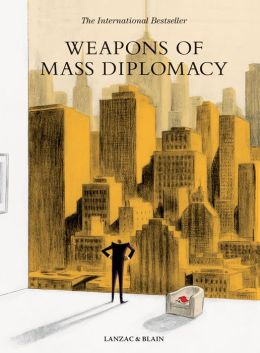
Politics are a theater of the absurd, populated by egotistical politicians, weary chiefs-of-staff, chain-smoking advisors and angry girlfriends, or so Lanzac, the pseudonym of a real French speechwriter, would have us believe. He paints a funny yet sobering look at French foreign politics that has to be read to be believed. International relations have never been more hilarious or terrifying. My original review is here.
The Wicked + The Divine, Vol. 1: The Faust Act by Kieron Gillen and Jamie McKelvie (Image, $9.99, 9781632150196).
Gods return to the world every 90 years in the guise of whatever is popular at the time, and in the 2010s, nothing is more popular than pop stars. Gillen and McKelvie go back to what they do best: mixing music and magic in new and inventive ways, this time adding some mythology to the mix. Lucifer as a Bowie-inspired diva is worth the price of admission alone.